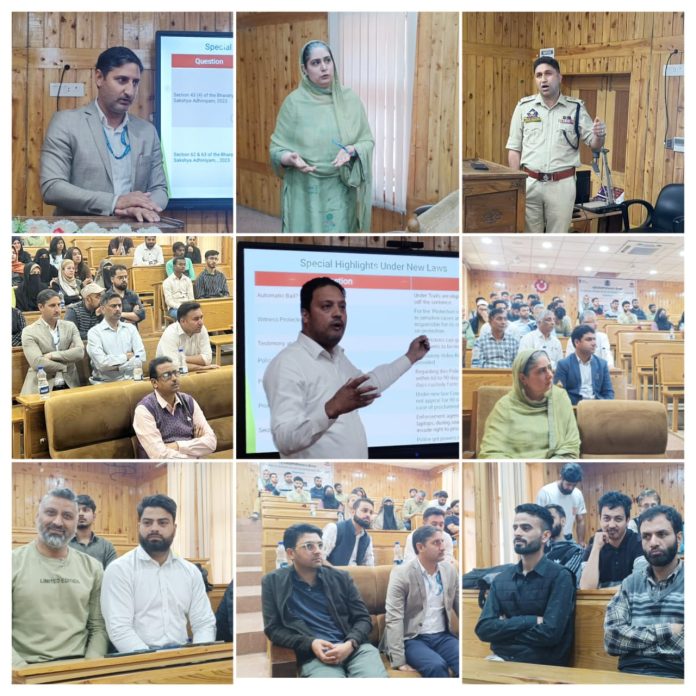NSS Volunteers distribute awareness posters among students on the campus
SRINAGAR: The National Institute of Technology (NIT) Srinagar on Wednesday organised an awareness program on newly amended criminal laws, where experts explained various aspects of these laws, highlighting their importance.
The event was graced by the presence of Institute’s Registrar Prof. Atikur Rahman, while SP Hazratbal Hilal Khaliq, Dr. Yasir Latief Handoo and Dr. Saba Manzoor Ganai were the resource persons in the awareness programme.
The event was aimed to educate the students and faculty about the three newly amended laws including Bharatiya Nyaya Sanhita, Bharatiya Nagarik Suraksha Sanhita and Bharatiya Sakshya Adhiniyam.
In his opening remarks, Registrar Prof. Atikur Rahman said that the primary objective of the program is to empower both students and faculty with basic understanding of newly amended three criminal laws.
“Law enforcement agencies alone cannot ensure a just society; active participation and awareness among citizens are equally indispensable. That is why there is a need for such awareness programs for students on the campus,” he said.
SP Hazratbal, Hilal Khaliq delivered a lecture on ‘New Criminal Laws-A General Overview. Understanding the changes in criminal laws is really important for all of us, he said.
“The new laws include provisions that ensure justice for crime victims and society at large, emphasizing the modernization of the investigation process through the use of technology and setting timelines for trials,” SP Hazratbal said.
On the occasion, Dr. Saba Manzoor Ganai from School of Law, University of Kashmir, delivered the lecture on “Bharatiya Nyaya Sanhita”. It aims to give precedence to offences against women and children and offences against State.
“The law also introduces community service as a punishment for petty offences. It changes to fines and punishments for various offences,” Dr. Saba added.
The third lecture on “Bharatiya Nagarik Suraksha Sanhita, and Bharatiya Sakshya Adhiniyam was delivered by Dr. Yasir Latief Handoo, from School of Law, University of Kashmir.
“This law addresses various aspects of public security, including measures to combat organized crime, terrorism, and cyber threats. Special attention is being given to protecting vulnerable groups, including women and children, from exploitation and violence. This law replaces the Code of Criminal Procedure, 1973,” he said.
Dr. Yasir further stated that Bharatiya Sakshya Adhiniyam, it is landmark legislation, this law aims to strengthen the evidentiary framework in criminal cases, ensuring fair trials and robust adjudication processes.
“It includes provisions to facilitate the testimony of women and marginalized communities, ensuring their voices are heard and their rights protected. This law replaces the Indian Evidence Act, 1872,” he said.
A formal vote of thanks was presented by DR (Admin) Faisal Irshad Ganai. He extended heartfelt appreciation to all participants and resource persons for their prompt attendance at the program.
“These awareness initiatives are imperative in the current times, ensuring both students and staff are well-informed about the occurrences within our nation,” he said.
Ganai said that it is essential that we disseminate this information amongst ourselves and subsequently enlighten others. This stands as the primary objective of such programs, he added.
The event was attended by Dean Planning & Development, Dr. Yashwant Mehta, AR (Director’s Office | Legal) Mohammad Hazik and AR (Special Secretary to Director) Shahid Hamid Najar, AR (Academic) Sheikh Fayaz Ahmad, AR (S&P) Hakim Mohammad Amin and other ministerial staff of the institution.
Earlier on Tuesday, Dr. Jitendra Gujjar and Dr Burhan flagged off and participated in NSS volunteers criminal law awareness rally from Fountain Park to Professor’s Quarters. The students distributed the awareness posters among the students within the campus.
The three new criminal laws Bharatiya Nyaya Sanhita, Bharatiya Nagrik Suraksha Sanhita and the Bharatiya Sakshya Adhiniyam were passed by Parliament in 2023 will come into effect from July 1, 2024. They will replace the Indian Penal Code, 1860; Code of Criminal Procedure, 1898; and the Indian Evidence Act, 1872 respectively.


